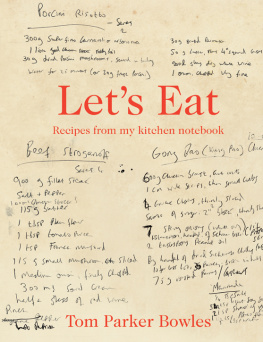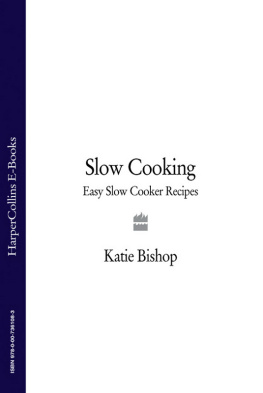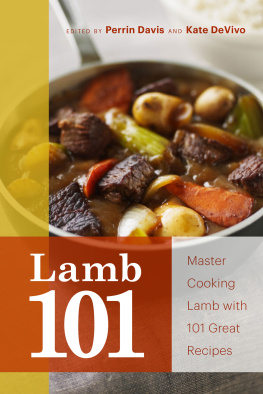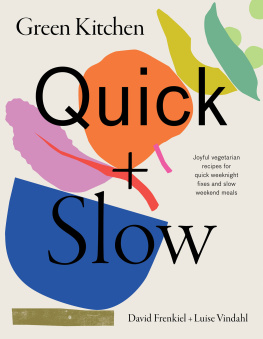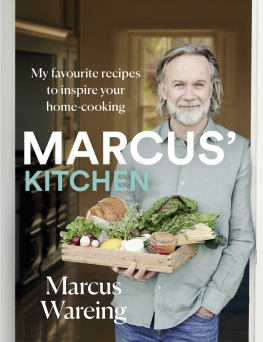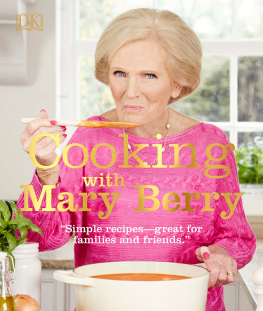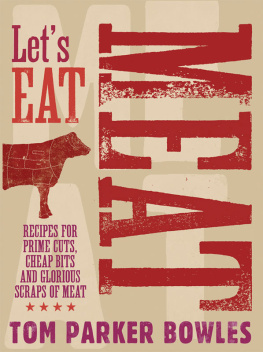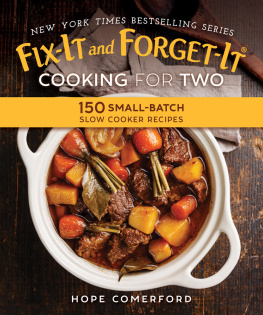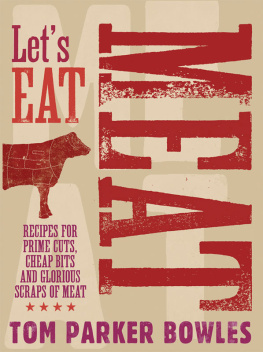Tom Parker Bowles is an award-winning food writer as well as a dedicated home cook. He writes a weekly column for the Mail on Sunday and is Food Editor of Esquire. He is also author of Full English (2009), which won The Guild of Food Writers Award for Work on British Food, as well as The Year of Eating Dangerously (2007) and E is for Eating An Alphabet of Greed (2004). He lives in London with his wife and two children.
Tireless in the pursuit of a good dinner, award-winning food writer and broadcaster Tom Parker Bowles has concentrated a life spent in thrall to his appetite into one cookbook, Lets Eat. The recipes range from the resolutely traditional and British (My mothers roast chicken or the classic Sticky toffee pudding) through the speediest of quick fixes (Steak or Spiced grilled mackerel) to the truly global (Ceviche, Thai beef salad and Mexican beef stew). But all can be easily cooked in the most everyday of kitchens. This is a book about flavour, succour and good cheer. Real food, for people who live to cook and eat.
Few food writers enjoy eating with gusto quite as much as does Tom. Now, with this deeply scrumptious book, he reveals how talented he is at the first bit: the cooking.
Simon Hopkinson


For Freddy
First published in the United Kingdom in 2012 by
PAVILION BOOKS
10 Southcombe Street
London
W14 0RA
An imprint of Anova Books Company Ltd
Text Tom Parker Bowles 2012
Design and layout Anova Books 2012
Photography Cristian Barnett 2012
The moral right of the author has been asserted.
All rights reserved. No part of this publication may be reproduced, stored in a retrieval system, or transmitted in any form or by any means electronic, mechanical, photocopying, recording or otherwise, without the prior written permission of the copyright owner.
Commissioning editor: Becca Spry
Design concept & cover: Georgina Hewitt
Photographer: Cristian Barnett
Home economist: Justine Pattison
Layout: Allan Sommerville
Copy editor: Maggie Ramsay
Stylist: Pene Parker
Production: Laura Brodie
Proofreader: Jamie Ambrose
Indexer: John Noble
Ebook ISBN: 978-1-90910-807-3
A CIP catalogue record for this book is available from the British Library.
10 9 8 7 6 5 4 3 2 1
First Ebook publication 2012
Also available in hardback ISBN: 978-1-86205-930-6
Introduction
I have a battered old leather recipe book, dark blue and stained with fat, ketchup and chilli sauce. And this book provides most of the recipes for Lets Eat. Entry into this shabby journal is every bit as exacting as a stage with Thomas Keller or Marco Pierre White. Each recipe has to earn its place. The process goes as follows: I travel to Mexico City, Bangkok, Palermo, Bolton or Vientiane. And eat. Everywhere and everything, my belly swelling as the days go past.
I take copious, scrawled notes and jot down recipes on scraps of paper, everything from ticket stubs to napkins (and as anyone who has ever spent any time eating Asian street food knows, their napkins make loo roll seem like canvas). Once back at my desk in London I attempt to decipher the name of a dish hiding beneath an errant scrap of noodle. Or a local ingredient blurred by a dousing of beer.
Yet this is not simply a travellers tome, but a collection of very British recipes, too. The food I grew up eating, and still adore. The shepherds pies and grilled sole, fresh asparagus and roasted grouse that never cease to thrill and delight.
At home, I cook each recipe at least three times, endlessly amending until it works (and gets the seal of approval from my wife; seriously, when she nods, the whole world agrees). Then, and only then, is it transcribed into the book. As the years pass, comments and additions find their way onto the pages. I love this leather volume, as much as I love my much-abused wok. Both have the patina of time and constant use, dirty and ragged to the outsider, but utterly beautiful to me. This book, like the wok, tells the story of my love of food. The scribbled additions, the infantile representations of the perfect-sized meatball and the scrawled notes, illegible to anyone but myself.




Lets Eat doesnt set out to sharpen your knife skills, nor redefine the way you view food. Taste takes precedence over pretty presentation and Ive little time for pious finger-wagging. Buy the best you can afford. Good free-range meat does cost more. The animals take longer to grow, are killed later, and are hung (in the case of beef) often for longer than a month. This means extra cash, sure. As well as extra flavour. And an immeasurably happier life for those beasts, too. But having promised I wouldnt, Im starting to lecture from the lofty heights of my food writers ivory tower.
The same goes for those endlessly repeated mantras of seasonal and local. Of course seasonal food is important, as this quarterly demarcation brings changes to the market and kitchen that never cease to delight. I passionately believe that the first British asparagus, arriving in late spring, is worth hanging on for, the taste made all the better by the nine-month wait, served with good melted butter and a sprinkling of salt. The same goes for grouse in August, native oysters in September (one drop of Tabasco, one of lemon), gulls eggs in May and strawberries in June. As one ingredient shuffles off for another year, its replaced by something equally beguiling. But I cant bear those boorish types who scream bloody murder if you eat an apple in spring.
Im all for local food, too, but dont start quivering with rage at the thought of air-freighted fruits and fancies. Our diet would be pretty dull without the likes of lemons and pepper, chocolate and coffee, rice and fish sauce. And is it really so evil to prefer a glossy, firm onion grown 100 miles away to some rotten, squidgy specimen from that crap shop down the road? Pragmatism is the key, not po-faced gloom.
Too often, cookbooks are written by chefs whove long forgotten the constraints of the home kitchen. I promise that therell be no recipe starting with the instruction, Take 30 litres of veal stock or Dip the whole pine nuts into the pine nut praline and then dip them into the liquid nitrogen Most of us hardly have room for a mini-blender, let alone a Pacojet processor or sous-vide bath.
Over the years, Ive cooked every recipe in this book in my own kitchens. Some of them were no bigger than the average store-cupboard. If you can soften onions on the wonky electric ring of a canary yellow Baby Belling with only two settings searing and Hades then you can do anything.

